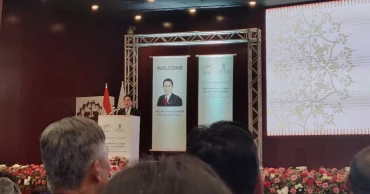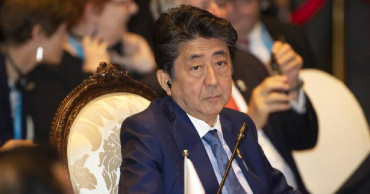Japanese PM
Former Japanese PM Shinzo Abe killer gets life in prison: Japanese court verdict
A Japanese court on Wednesday sentenced a man who admitted to assassinating former Prime Minister Shinzo Abe to life imprisonment, a case that has drawn attention to long-standing ties between Japan’s ruling party and a controversial South Korean religious group, NHK reported.
Tetsuya Yamagami, 45, pleaded guilty to killing Abe in July 2022 while the former leader was giving an election campaign speech in Nara. The Nara District Court confirmed the verdict and handed down a life sentence, in line with prosecutors’ demands. The trial, which began in October, saw Yamagami admit to murder.
Abe, one of Japan’s most influential politicians, was serving as a lawmaker after stepping down as prime minister when he was shot dead. His killing shocked the nation, known for strict gun control.
During the trial, Yamagami said he was motivated by anger toward a controversial religious group after seeing a video message Abe sent to a faction linked to the Unification Church. He told the court his aim was to harm the church and expose its connection with Abe.
Prosecutors sought life imprisonment, while Yamagami’s lawyers argued for no more than 20 years, citing his troubled childhood as the son of a church follower. While Japanese law allows the death penalty for murder, prosecutors usually seek it only in cases involving multiple victims.
The assassination intensified scrutiny of the ruling Liberal Democratic Party’s ties to the church, prompting the party to distance itself from the group. Investigations later led to the Japanese branch of the church losing its tax-exempt status and being ordered dissolved. The case also prompted authorities to review and strengthen security for political figures.
Abe was shot on July 8, 2022, outside a train station in Nara. Television footage showed him collapse after two shots, with officials saying he died almost instantly. Yamagami was arrested at the scene and later said he had originally planned to target the Unification Church leader but switched to Abe due to security difficulties.
Read More: Japan PM plans snap election to seek fresh mandate
The case highlighted the challenges faced by children of Unification Church followers and influenced legislation aimed at curbing coercive donation practices. Yamagami has also drawn public sympathy from critics of the church, with thousands signing petitions seeking leniency and others sending care packages to his family and the detention center where he is held.
1 month ago
Summit talks between Bangladesh and Japanese PMs underway in Tokyo
On the second day of her visit to Japan Prime Minister Sheikh Hasina on Wednesday started the summit meeting with her Japanese counterpart Kishida Fumio at the latter’s office here in Tokyo to take the bilateral relations to a “Strategic Partnership” from the existing “Comprehensive Partnership.”
She is leading the Bangladesh side while the Japanese prime minister is leading his country’s side at the summit talks being held at the large meeting room of the Japanese Prime Minister Office.
On her arrival here, the Bangladesh Prime Minister was received by Kishida Fumio at the entrance hall of the Japanese Prime Minister Office.
Also read: PM Hasina calls on Japan Emperor Naruhito in Tokyo
Hasina was given a guard of honour at the Prime Minister Office of Japan. She took the salute and inspected the guard of honour.
After the summit meeting, both the prime ministers will sign a joint statement. They will also witness the exchange of bilateral agreements, and memorandums of corporations (MoCs) to be signed between the two countries.
Hasina arrived here in Tokyo on Tuesday on a four-day official visit to Japan at the invitation of her Japanese counterpart Kishida.
2 years ago
Lack of security for Japanese prime minister surprised many
The fishermen who tackled the man suspected of the second attack on a Japanese political leader in less than a year were surprised by the lack of security for Prime Minister Fumio Kishida.
Fisherman Tsutomu Konishi was watching Kishida at a campaign event at this fishing port when an object flew overhead and landed near the prime minister, Konishi said. A security officer covered the object with a bulletproof briefcase, Konishi said. The fishermen swarmed the attacker.
“I never thought a crime like this would happen in my hometown, which is a rather small fishing area,” Konishi, 41, said Sunday as he sipped a can of coffee at the port of Saikazaki. “I’m still shocked and stunned."
The prime minister was unhurt but like many others in Japan, Konishi was mulling Sunday what the country should do to better protect public figures.
“At a time when Japan’s serving prime minister was visiting, perhaps we may have needed a metal detector,” Konishi said.
Masaki Nishide, a 55-year-old fisherman from Saikazaki, said most of the people at Saturday’s event were residents and supporters of the local candidate. He said the young man carrying the silver-gray backpack stood out.
Also Read: Japanese PM unhurt after blast during campaign event
“People here all dress like me, and nobody carries a backpack; it was only him,” Nishide said, wearing a sweatsuit and red rubber boots. “If I were in charge of security, I would have asked for a bag check.”
After the failed attack on the prime minister, one of the fishermen grabbed the suspect's neck from behind, another pushed his head down, and Konishi latched onto his leg. They were holding the man as police officers pulled him to the ground.
The chaotic scene was reminiscent of the assassination nine months ago of former Prime Minister Shinzo Abe, which prompted police to tighten their protective measures after an investigation found holes in Abe’s security. Abe, one of Japan’s most influential and divisive politicians, was killed with a homemade gun during a campaign speech.
Also Read: Explosion at Japan port during PM Kishida visit, no injuries
Suspect Tetsuya Yamagami has been charged with murder and several other crimes, including violating gun-control laws.
Authorities have said Yamagami told investigators he killed Abe because of the former prime minister’s apparent links to a religious group that Yamagami hated. In statements and in social media postings attributed to him, Yamagami said his mother's donations to the Unification Church bankrupted his family and ruined his life.
Violent crimes are rare in Japan, and with its strict gun control laws, the country has only a handful of gun-related crimes annually. Most of the cases are gang-related, though in recent years there has been growing concern about homemade guns and explosives. There also have been some high-profile cases of random knifing on subways and arson attacks.
Groups of several officers have guarded serving prime ministers. Fewer officers have been watching Cabinet ministers and former leaders.
Compared with the U.S. elections, audience at political campaigns in Japan are often allowed to be quite close to dignitaries. At the campaign event for Kishida the front-row audience was within touching distance.
Only one person, a police official, was hurt, his arm cut by fragments of the device, which didn't fully explode. Police arrested 24-year-old Ryuji Nakamura on suspicion of throwing an explosive in a metal tube at Kishida.
Police sent a special counter-explosives team to the suspect's home in Hyogo prefecture to search for evidence of bomb-making. There are nationwide local elections this month. and Japan is hosting a series of Group of Seven meetings leading up to the May 19-21 leaders' summit in Hiroshima. Diplomats arrived Sunday for the G-7 foreign ministers' meeting in Karuizawa.
Isao Itabashi, a public safety expert, said on NHK TV that the attack raised questions about how election campaigns are being handled. Guarding top politicians in campaigns is logistically hard, and balancing tight security with a free election is also difficult, he said.
Kiyotaka Hamada, 70, a senior member of the local fishing association, said he felt something hit his shoulder just as he heard the bang and was running from the scene. Police took his jacket to see if he'd been hit by a fragment of the explosive.
“I just want to ask the suspect why he had to come here to make trouble," he said.
For Hamada and other fishermen, there's worry also about the expected loss of income from the days they cannot work while the port facilities are closed for the investigation.
“We put so much effort throughout the village to welcome the prime minister here on his first ever visit,” Hamada said. “Now we cannot even go out to sea.”
2 years ago
Tokyo studying prospect of economic partnership agreement with Dhaka: Japanese PM
Japanese Prime Minister Kishida Fumio on Monday said Bangladesh will soon graduate from being classified as a least developed country, and they have already launched the Joint Study Group on the possibility of an Economic Partnership Agreement with Bangladesh.
He said this also reflects the important Free and Open Indo-Pacific (FOIP) principle of "excluding no one."
The Japanese Prime Minister was delivering a policy speech at the Indian Council of World Affairs (ICWA).
He described Japan's plan to develop a "Free and Open Indo-Pacific."
Also Read: Japan PM Kishida to announce new Indo-Pacific plan in India
"To achieve this, India is an indispensable partner. I believe that Japan and India are in an extremely unique position in the current international relations and, furthermore, in the history of the world," he said.
India is the largest democracy in the world, said the Japanese PM, adding that they have always viewed with great respect the way such a huge and diverse country as India has developed democracy.
"Japan, for its part, was the first country in Asia to achieve modernization and embrace democracy," he said.
Also Read: 11 Bangladeshi auto mechanics get jobs in Japan
"It is fair to say that both countries are naturally receptive to and fully committed to the idea of electing governments through general elections and deciding policies through public debate," said Kishida Fumio.
He said Japan and India have a great responsibility for maintaining and strengthening "a free and open international order based on the rule of law."
"This year, as Japan holds the G7 presidency and India holds the G20 presidency, my hope is that, through working together with ASEAN and other many countries, we will bring about peace and prosperity to the international community, which faces a time of challenges," he said.
The vision for achieving this is FOIP, a "Free and Open Indo-Pacific" based on the rule of law.
"I believe that this region will be a "place where freedom and the rule of law are valued, free from force or coercion."
The PM said Japan will spare no efforts to cooperate with India for the success of the G20.
"I am looking forward to welcoming Prime Minister Modi to Hiroshima in May and visiting India again in September," he said.
Prime Minister of Japan Kishida Fumio is paying an official visit to India on 20-21 March.
2 years ago
Economic ties with Bangladesh to make leap: Japanese PM
The economic relations between Bangladesh and Japan, marked by a great potential, will make a further leap forward in the years to come, Japanese Prime Minister Yoshihide Suga said Wednesday.
4 years ago
BNP greets new Japanese PM
BNP on Wednesday greeted Yoshihide Suga for being elected as the Prime Minister of Japan.
5 years ago
Interview: Japanese PM expects China trip to further consolidate bilateral ties
High-level visits and exchanges between Japan and China are of great significance, Japanese Prime Minister Shinzo Abe said, expressing the hope that his upcoming trip to China will serve as an opportunity to further consolidate bilateral relations.
6 years ago





.jpg)





